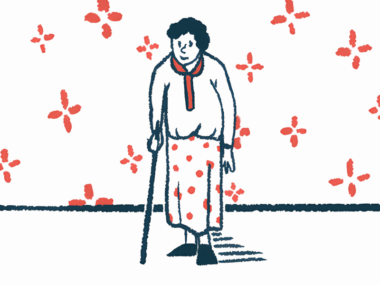I’m afraid of lions and tigers, but not Parkinson’s disease
Maintaining a positive attitude helps to keep me energized
Written by |

A friend told me recently that she was very fearful about what the future held for her with Parkinson’s disease. This got me thinking about how I feel about the future. Was I afraid? After some soul searching, I realized that, at this point at least, I’m not afraid.
There have been times in my life when I knew real fear, but right now, I’m feeling good — positive, grateful, and hopeful.
I’ve mentioned this before, but when my husband, John, and I were married, we quit our jobs and set out on an epic cycling trip around the world. It was 1991, and we had no idea what the future held. Would we have done the trip if we knew I was going to be diagnosed with Parkinson’s disease at age 54? I don’t know. We fit a whole lot of living into that year, though. We were not afraid of anything. Well, maybe a couple of things.
We flew into Kathmandu, Nepal, about six months into our trip. We cycled from the airport and entered the madness of Kathmandu traffic. People, cows, tuk-tuks, taxis, bicycles, and dogs were everywhere. We were seasoned travelers, but we were still shocked by the chaos and terrorized by the vehicles. A child even threw a rock at my head.
What was there to be afraid of?
After two days in Kathmandu, we rode to Nagarkot, at the rim of the Kathmandu Valley. Known for its views of the Himalayas, including Mount Everest, it was only 35 kilometers away, but all uphill. The cycling was difficult, but the views were spectacular — featuring terraced fields, forests, and stunning mountain vistas. The air felt clean and clear.
When we arrived at the outskirts of Nagarkot, the local kids, keen to earn rupees, eagerly ran around, telling us where we should stay. There was actually only one place, a very simple guesthouse with a view of the Himalayas from the bedroom window.
Since there were no other places around, we went to dinner at the aptly named “Restaurant at the End of the Universe,” about a kilometer away along a narrow mountain path. I wanted to bring a flashlight because it would be dark on our way back. But John wasn’t having it.
“It’s going to be too hard for us to see!” I insisted.
“Our eyes will adjust to the dark,” John said. “What are you afraid of?”
“Lions? Tigers? Bears?” I said. There was no way I was heading out without a flashlight.
The dinner at the restaurant was delicious, and the experience was hilarious. It quickly became apparent that the other customers were in high spirits, courtesy of the wild-growing marijuana in Nepal. Their infectious laughter set the tone for the evening, and as we made our way back to the guesthouse, flashlight in hand, we were still chuckling about it. Back in the safety of our room, John couldn’t resist teasing me about my fear of the dark.
Primal fears
We got up at 5 a.m. to get a good view of Everest before the clouds settled in. We went outside and were greeted by the guesthouse owner, who looked exhausted as he leaned on the railing, gazing at the lush, green valley below.
“How did you sleep?” he asked.
“Great! How about you?” John asked.
“I didn’t sleep a wink! The tigers kept me up all night. They were fighting behind the guesthouse. I’m surprised they didn’t wake you up.”
John looked at me. I think I said something like, “What the heck?”
We cycled back to Kathmandu and passed some hunters along the way. We stopped to ask what they were hunting. “Lions!” they said cheerfully.
Primal fear number two unlocked.
The rest of that trip, John tried to convince me that a wild animal would not eat me. Thankfully, it was all downhill, so we could cycle very quickly. We didn’t stop for lunch.
These days, I I don’t think much about what frightens me, but rather what I am grateful for: My husband and family, laughter, and friends are all at the top of the list. This positivity is what energizes me to keep going and not be so terrified that Parkinson’s is going to eat me for a midnight snack.
Note: Parkinson’s News Today is strictly a news and information website about the disease. It does not provide medical advice, diagnosis, or treatment. This content is not intended to be a substitute for professional medical advice, diagnosis, or treatment. Always seek the advice of your physician or another qualified health provider with any questions you may have regarding a medical condition. Never disregard professional medical advice or delay in seeking it because of something you have read on this website. The opinions expressed in this column are not those of Parkinson’s News Today or its parent company, Bionews, and are intended to spark discussion about issues pertaining to Parkinson’s disease.







Leave a comment
Fill in the required fields to post. Your email address will not be published.